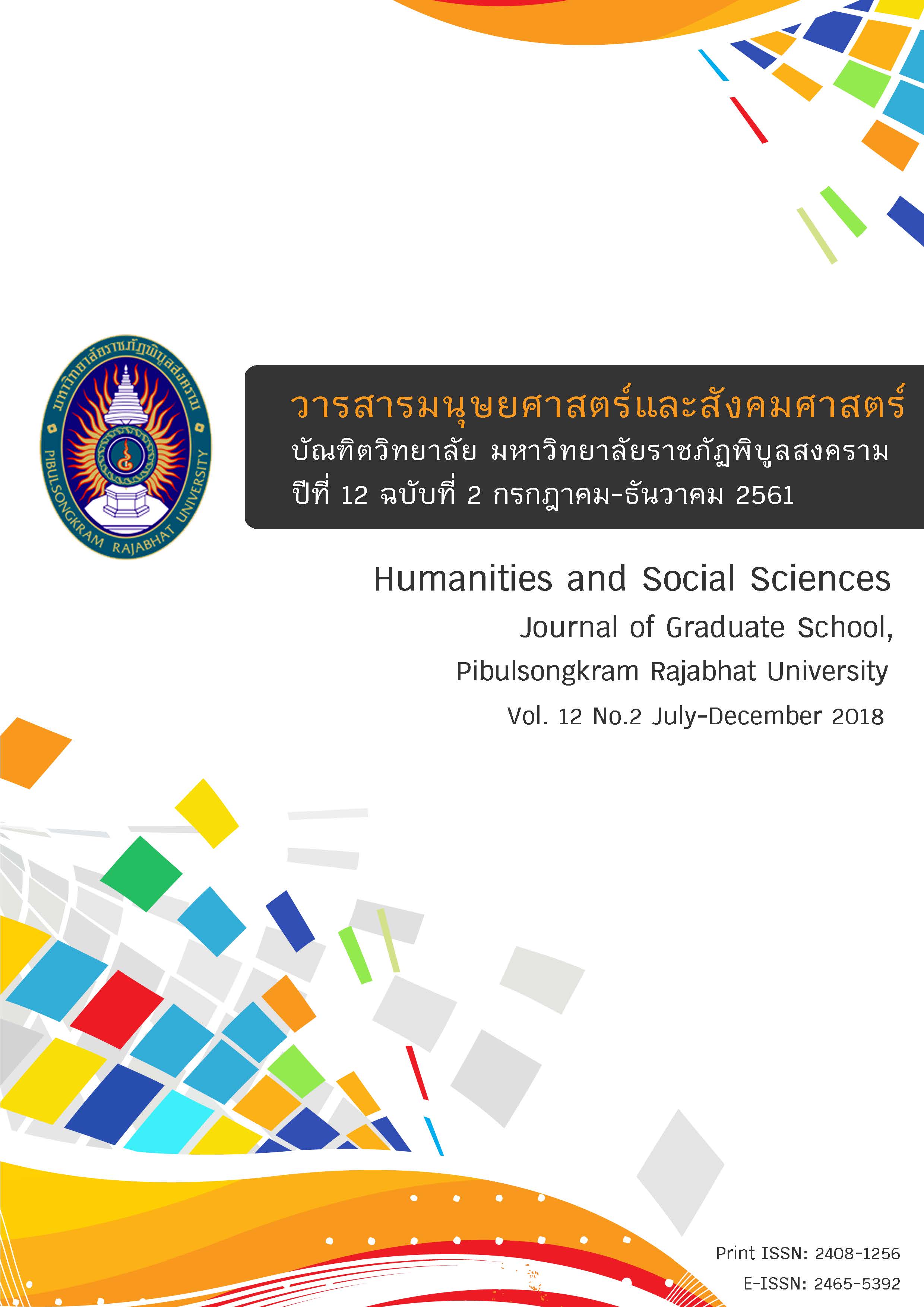Strategy Development for Professional School Directors under Kamphaengphet Primary Educational Service Area Office 1 and Office 2
Keywords:
Strategy, Professional school directorsAbstract
The objectives of this research were 1) to study the characteristics of professional school directors, by analyzing the documents and a questionnaire; data were collected from the experts, school directors, teachers, 2) to study the states, the problems and the factors related to professional school directors, using the questionnaire and group discussion; data were collected from school directors, teachers, 3) to develop strategies of professional school directors, 2 workshops and expert seminars; data were collected from educational administrators, school directors, teachers, and 4) to assess the strategies of professional school directors, using the strategic assessment; data were collected from educational administrators, school directors, and professionals and analyzed by using frequency, mean, standard deviation and content analysis
The research showed that 1) the characteristics of professional school directors in every aspect overall were at a high level and when considering by items it was found that they had moral and ethics the most; whereas they had professional in academic characteristics the least. 2) The state, problems and factors were at a high level in all aspects. In terms of development, it was found that the school directors developed themselves from their working units the most. The development problem found that the school directors lacked the development plan and monitoring and evaluation. The strength on development factors found that the school directors performed their jobs concretely, were eager to learn the development. The weakness found that the school directors had an unclear plan, without system, undiversified formats, lack self-analysis, discontinuous follow up, inadequate budget. In terms of opportunity, it was found that policy: the society focused on the importance of development support, speedy technology which supported the utility. In terms of threats, the changing social and economic threats resulted to the budget allocation for discontinuous project/activity. 3) The strategic development for professional school directors comprised Vision, Mission, Strategic Objectives, Strategy Issues, Strategy, Indicators and Measures. The strategy developed 7 strategies for the organization as follows: 1) Self-development plan for professional school directors should be well-managed. 2) School directors’ abilities were developed for professional levels. 3) School directors should be supported to use research and innovations for school development continuously. 4) School directors should be promoted in their abilities of using English and information technology. 5) Learning informational data should be improved to be modern. 6) Development network should be supported. 7) The process of evaluation should be developed for efficient management. There were 4 strategies for self-development as follows: 1) The plan for self-development should be well-managed. 2) The characteristics of professional school directors should be supported to meet the roles of school directors in the 21st Century. 3) School directors should improve themselves with the development plan. 4) School directors should assess themselves and also improve themselves with the evaluation results. The results of the strategic evaluation were consistent, feasible, possible and useful.
References
ชัญญา อภิปาลกุล. (2545). รูปแบบการพัฒนาผู้บริหารสถานศึกษาเพื่อปฏิรูปการเรียนรู้ในสถานศึกษา SINTPAE Model (ฉบับสรุป). กรุงเทพฯ: สำนักงานคณะกรรมการการศึกษาแห่งชาติ.
ชัยยนต์ เพาพาน. (2559). ผู้บริหารสถานศึกษายุคใหม่ในศตวรรษที่ 21. ใน การประชุมวิชาการระดับชาติครุศาสตร์ ครั้งที่ 1 การจัดการศึกษาเพื่อพัฒนาท้องถิ่นสู่ประชาคมอาเซียน: ทิศทางใหม่ในศตวรรษที่ 21. (น. 301-313).
สืบค้น 15 กันยายน 2559, จาก http://conference.edu.ksu.ac.th/file/20160809_2488101126.pdf
ณัฏฐพันธ์ เขจรนันทน์. (2552). ยอดกลยุทธ์การบริหารสำหรับองค์การยุคใหม่. กรุงเทพฯ: เอ็กซเปอร์เน็ท.
ธีระ รุญเจริญ. (2550). ความเป็นมืออาชีพชีพในการจัดและบริหารการศึกษา (พิมพ์ครั้งที่ 4). กรุงเทพฯ: ข้าวฟ่าง.
นิตยา ทองไทย. (2556). คุณลักษณะผู้บริหารสถานศึกษามืออาชีพตามความคิดเห็นของผู้บริหารและครูในสถานศึกษา. (วิทยานิพนธ์ครุศาสตรมหาบัณฑิต). มหาวิทยาลัยราชภัฏเทพสตรี, ลพบุรี.
นุชนรา รัตนศิระประภา. (2557). สมรรถนะของผู้บริหารที่ส่งผลต่อคุณลักษณะโรงเรียนมาตรฐานสากล สังกัดสำนักงานคณะกรรมการการศึกษาขั้นพื้นฐาน. วารสารวิชาการ Veridian E-Journal, 7(3), 507-528.
นันทิยา หุตานุวัตรและณรงค์ หุตานุวัตร. (2547). การพัฒนาองค์กรชุมชน (พิมพ์ครั้งที่ 2). อุบลราชธานี: คณะเกษตรศาสตร์ มหาวิทยาลัยอุบลราชธานี.
บุญชม ศรีสะอาด. (2553). การวิจัยเบื้องต้น (พิมพ์ครั้งที่ 5). กรุงเทพฯ: สำนักพิมพ์สุวีริยาสาส์น.
ปกรณ์ ปรียากร. (2553). การวางแผนกลยุทธ์: แนวคิดและแนวทางเชิงประยุกต์. กรุงเทพฯ: เสมาธรรม.
ประยูร อัครบวร. (2553). การวางแผนและกำหนดยุทธศาสตร์. กรุงเทพฯ: โรงพิมพ์แห่งจุฬาลงกรณ์มหาวิทยาลัย.
พิสิฐ เทพไกรวัล. (2554). การพัฒนารูปแบบเครือข่ายความร่วมมือเพื่อคุณภาพการจัดการศึกษา ในโรงเรียนประถมศึกษาขนาดเล็ก. (วิทยานิพนธ์ปรัชญาดุษฎีบัณฑิต). มหาวิทยาลัยขอนแก่น, ขอนแก่น.
เพ็ญวรา ชูประวัติ. (2553). การพัฒนากลยุทธ์การบริหารเทคโนโลยีสารสนเทศและการสื่อสารเพื่อการศึกษาในโรงเรียนสังกัดสำนักงานเขตพื้นที่การศึกษากรุงเทพมหานคร. กรุงเทพฯ: จุฬาลงกรณ์มหาวิทยาลัย.
ศรีทน ละม่อม. (2552). ผลการพัฒนาความสัมพันธ์ระหว่างโรงเรียนกับชุมชนโดยใช้วงจร PDCA ของโรงเรียนดอนทอวิทยา สังกัดสำนักงานเขตพื้นที่การศึกษาประถมศึกษาพิษณุโลก เขต 1. (วิทยานิพนธ์ครุศาสตรมหาบัณฑิต). มหาวิทยาลัยราชภัฏเพชรบูรณ์, เพชรบูรณ์.
สำนักงานเลขาธิการสภาการศึกษา. (2552). การปฏิรูปการศึกษาในทศวรรษที่สอง (พ.ศ. 2552-2561). กรุงเทพฯ: พริกหวานกราฟฟิค.
สำนักงานคณะกรรมการการพัฒนาการเศรษฐกิจและสังคมแห่งชาติ. (2554). แผนพัฒนาเศรษฐกิจและสังคมแห่งชาติฉบับที่ 11 พ.ศ. 2555-2559. กรุงเทพฯ: สหมิตรพริ้นติ้งแอนด์พับลิชชิ่ง.
สำนักงานรับรองมาตรฐานและประเมินคุณภาพการศึกษา (องค์การมหาชน). (2558). ผลการประเมินสถานศึกษาระดับสถานศึกษาขั้นพื้นฐานรอบที่สอง (พ.ศ. 2554-2558). กรุงเทพฯ: องค์การมหาชน.
สมเกียรติ ตั้งกิจวานิชย์. (2556). การจัดทำยุทธศาสตร์การปฏิรูปการศึกษาขั้นพื้นฐานให้เกิดความรับผิดชอบ. กรุงเทพฯ: มูลนิธิสถาบันวิจัยเพื่อการพัฒนาประเทศไทย.
สมชาย เทพแสง และอรจิรา เทพแสง. (2549). ผู้นำยุคใหม่: หัวใจของการปฏิรูป. นนทบุรี: เกรท เอ็ดดูเคชั่น.
สมพร ศิลป์สุวรรณ์. (2550). HR กับการพัฒนาองค์กรสู่ High Performance Organization. (เอกสารประกอบการสัมมนาวิชาการและการบรรยาย วันที่ 15-16 พฤศจิกายน 2550 ณ โรงแรม มิราเคิล
แกรนด์ คอนเวน กรุงเทพ). สมาคมการจัดการงานบุคคลแห่งประเทศไทย.
สมยศ นาวีการ. (2538). การบริหาร (Management) (พิมพ์ครั้งที่ 2). กรุงเทพฯ: สามัคคีสาร (ดอกหญ้า).
สายฝน เสกขุนทด. (2546). การพัฒนาแผนกลยุทธ์ด้านเทคโนโลยีสารสนเทศและการสื่อสาร ของสถาบันราชภัฏราชนครินทร์. (วิทยานิพนธ์ครุศาสตรดุษฎีบัณฑิต). จุฬาลงกรณ์มหาวิทยาลัย, กรุงเทพฯ.
สุภาพร พงศ์ภิญโญโอภาส. (2556). การพัฒนากลยุทธ์การบริหารงานวิจัยของมหาวิทยาลัยราชภัฏกลุ่มภาคเหนือตอนล่าง. (วิทยานิพนธ์ปรัชญาดุษฎีบัณฑิต). มหาวิทยาลัยราชภัฏกำแพงเพชร, กำแพงเพชร.
สุวิมล ว่องวาณิช. (2552). รายงานการวิจัยการวิเคราะห์กระบวนการพัฒนาการศึกษาของโรงเรียนภายหลังการประเมินภายนอกรอบแรก. กรุงเทพฯ: จุฬาลงกรณ์มหาวิทยาลัย.
สุรศักดิ์ ปริญญารัตนชัย. (2544). แนวคิดเกี่ยวกับการบริหารจัดการ. สืบค้น 1 มิถุนายน 2556, จาก http://thesis.swu.ac.th/swuthesis/Rec_Man/Teerin_P.pdf
สุรัสวดี ราชกุลชัย. (2547). การวางแผนและการควบคุมทางการบริหาร. กรุงเทพฯ: จุฬาลงกรณ์มหาวิทยาลัย.
หวน พินธุพันธ์. (2548). การบริหารการศึกษา: นักบริหารมืออาชีพ. นนทบุรี: พินธุพันธ์การพิมพ์.
Deming, W. E. (1995). Out of The Crisis. USA: The Massachusetts Institute of Technology Center for Advanced Engineering Study.
Dennis, D. R. (1997). Strategic Planning. New York : Harper Collins College Publishers.
Downloads
Published
How to Cite
Issue
Section
License
Any articles or comments appearing in the Journal of Humanities and Social Sciences, Rajabhat Phibulsongkram University, are the intellectual property of the authors, and do not necessarily reflect the views of the editorial board. Published articles are copyrighted by the Journal of Humanities and Social Sciences, Rajabhat Phibulsongkram University.









